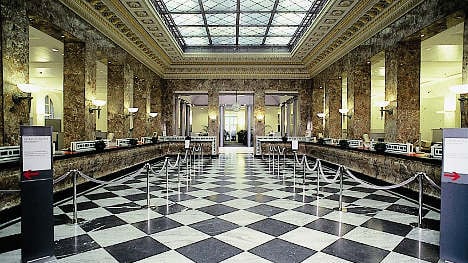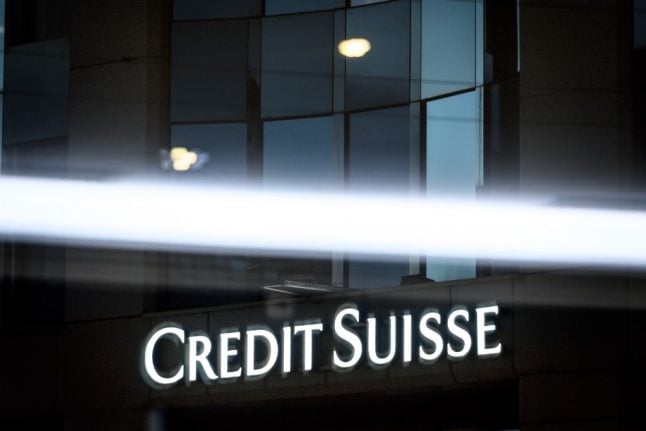Tax evasion has become "a real problem for Swiss banks, because it is damaging their reputation" an analyst with a large Zurich-based bank told AFP, requesting anonymity.
"A few years ago, the banks saw taxation as the client's problem, but today, that has changed. It has become the bank's problem," he added.
A scandal surrounding former French budget minister Jerome Cahuzac, who last week was charged with tax fraud after admitting to having an undeclared foreign bank account, has not only sent shockwaves through the French
political establishment, but also through the Swiss banking sector.
Cahuzac — once in charge of tackling tax evasion — has admitted to opening an undeclared Swiss bank account in 1992, and, after Switzerland pledged to cooperate with foreign tax authorities in 2009, transferring the some 600,000 euros ($770,000) to Singapore.
Switzerland with its cherished banking secrecy rules was long considered a prime destination for undeclared funds, but the country has recently been cracking down in a bid to clear its reputation as a tax haven.
"We are moving towards a model of (accepting only) declared funds, but I can't tell you how long or what shape it will take," a high-level executive at one of Switzerland's main banks told AFP on condition of anonymity.
Under pressure from all sides, Swiss banks have gradually been trying to solve the problem, case by case, country by country.
After Washington a few years ago began aggressively going after Swiss banks enabling US clients to evade the taxman, a solution has been reached that basically blocks banks from hosting undeclared accounts for Americans.
And Switzerland reached agreements last year with Britain, Austria and Germany to ease its bank secrecy and ensure that their nationals' holdings in Swiss banks were taxed.
The accords with London and Vienna took effect on January 1st, but the German parliament ended up blocking that country's deal late last year, considering it too easy on tax cheats.
Banks have begun closing undeclared accounts
Even though the German deal fell through, two large Swiss banks, Credit Suisse and Julius Baer, have opted to start kicking out German clients who refuse to declare their holdings back home.
While no measures have yet been announced when it comes to French nationals with Swiss bank accounts, Geneva tax attorney Philippe Kenel told AFP he believed they would soon receive the same treatment as their German counterparts.
"The large Swiss banks first, and then the small ones, will begin closing French citizens' undeclared accounts," he predicted.
"This is already happening when it comes to German clients, and it will happen with French clients as well," he added.
A Geneva banker who asked not to be named agreed.
"What is clear today is that the number of clients with undeclared accounts will shrink," he said.
Closing the door on all tax-cheating clients could be painful exercise for a number of Swiss banks.
According to a banking law professor at the University of Geneva, who did not want his name published, more than half of the European funds stashed away in Swiss bank accounts are undeclared.
In practice, however, the Swiss banks can do little to weed out clients intent on cheating the system.
Demanding that all clients provide full tax returns from their home countries is considered mission impossible, due to the mountains of paperwork and since most clients would likely refuse outright, banking industry sources say.
Instead, banks are opting to have clients sign a document certifying that their tax papers are in order, and blindly trusting that they are telling the truth.
Cahuzac, for instance, reportedly handed over a "bogus" certificate to the Singapore branch of a wary Julius Bär bank, purportedly showing that his money had been declared to tax authorities.
Convinced that he was telling the truth, the bank had agreed to transfer his funds to Singapore.
According to the latest available statistics from Switzerland's central bank, Swiss banks in 2011 managed 31.78 billion francs (26 billion euros) for French clients.
That is not counting the some 2.55 billion francs that Swiss trusts handled for French nationals that year.
TAX EVASION
Swiss banks keen to avoid tax cheats: experts
Amid a massive scandal involving France's former budget minister and an undeclared Swiss bank account, Swiss banks are more eager than ever to kick out tax cheats and clear their names, bankers and industry experts say.
Published: 9 April 2013 10:29 CEST

UBS counter hall in Zurich. Photo: UBS
Url copied to clipboard!


 Please whitelist us to continue reading.
Please whitelist us to continue reading.
Member comments